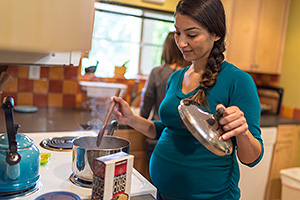Quick Tips: Healthy Pregnancy Habits
Getting Started

Here are ways you can have a healthy pregnancy.
- See your doctor or midwife regularly.
- Visit your doctor or midwife as soon as you suspect you are pregnant.
- Go to all of your prenatal checkups.
- Get treatment for all infections. Call your doctor or midwife if you have signs of an infection during pregnancy, such as a fever or unusual vaginal discharge.
- Make healthy food choices.
- Choose vegetables and fruits, whole grain foods, and protein foods.
- Get enough folic acid. Take a daily vitamin supplement that contains 0.4 mg to 0.8 mg (400 mcg to 800 mcg) of folic acid.
- Remember that your nutritional needs increase during pregnancy. If you are not sure about what or how much to eat, talk with your doctor or midwife.
- Be active.
- Get regular aerobic and strength-conditioning exercise. Activities like swimming and walking are safe choices.
- Don't exercise if you're not feeling well.
- Avoid exercising outdoors if the weather is hot.
- Avoid exercising at a high altitude (above 1,800 metres [6,000 feet]). If you live in a place with a high altitude, talk to your doctor or midwife about how you can exercise safely.
- Get plenty of rest.
- Go to bed earlier than usual and get up later, if possible.
- Take naps if you can, unless napping makes you sleepless at night.
- Put your feet up and rest as often as you can during the day.
- Get help with housework and other duties whenever possible.
- Take care of your emotional health.
- Try things that relieve stress, such as breathing exercises or yoga.
- Talk to your doctor or midwife if you are feeling sad or anxious and it's not getting better.
- Be careful with medicines.
- Talk to your doctor or midwife about medicines that you use, including prescription and over-the-counter medicines and natural health products. Some medicines and natural health products have been linked to birth defects.
- Check with your doctor or midwife before you take any new medicine or natural health product including vitamins and supplements.
- Avoid smoking, vaping, drinking alcohol, and using drugs.
- If you smoke or vape, quit or cut back as much as you can. Smoking and vaping can be harmful to your pregnancy. Talk to your doctor or midwife if you need help to quit.
- If you use alcohol, cannabis, or other drugs, quit or cut back as much as you can. It's safest not to use them at all. Talk to your doctor or midwife if you need help to quit.
- Think safety first.
- Get Immunized
- Get your influenza vaccine. You need 1 dose of influenza vaccine each influenza season. You can have it anytime during your pregnancy.
- Get your pertussis (whooping cough) booster. In Alberta, the tetanus, diphtheria, and pertussis (Tdap) vaccine is recommended for every pregnancy, even if you’ve had it before. You’ll usually get this vaccine when you’re between 27 and 32 weeks pregnant. In some situations your healthcare provider may recommend Tdap be given earlier. Talk to your healthcare provider about when to get the Tdap vaccine. The Tdap vaccine was previously called the dTap vaccine.
- It is safe to get these vaccines when you’re pregnant. They’ll protect you and your baby from these diseases. Your baby will even be protected for their first few months of life.
Credits
Adaptation Date: 06/12/2024
Adapted By: Alberta Health Services
Adaptation Reviewed By: Alberta Health Services
Adaptation Date: 06/12/2024
Adapted By: Alberta Health Services
Adaptation Reviewed By: Alberta Health Services
